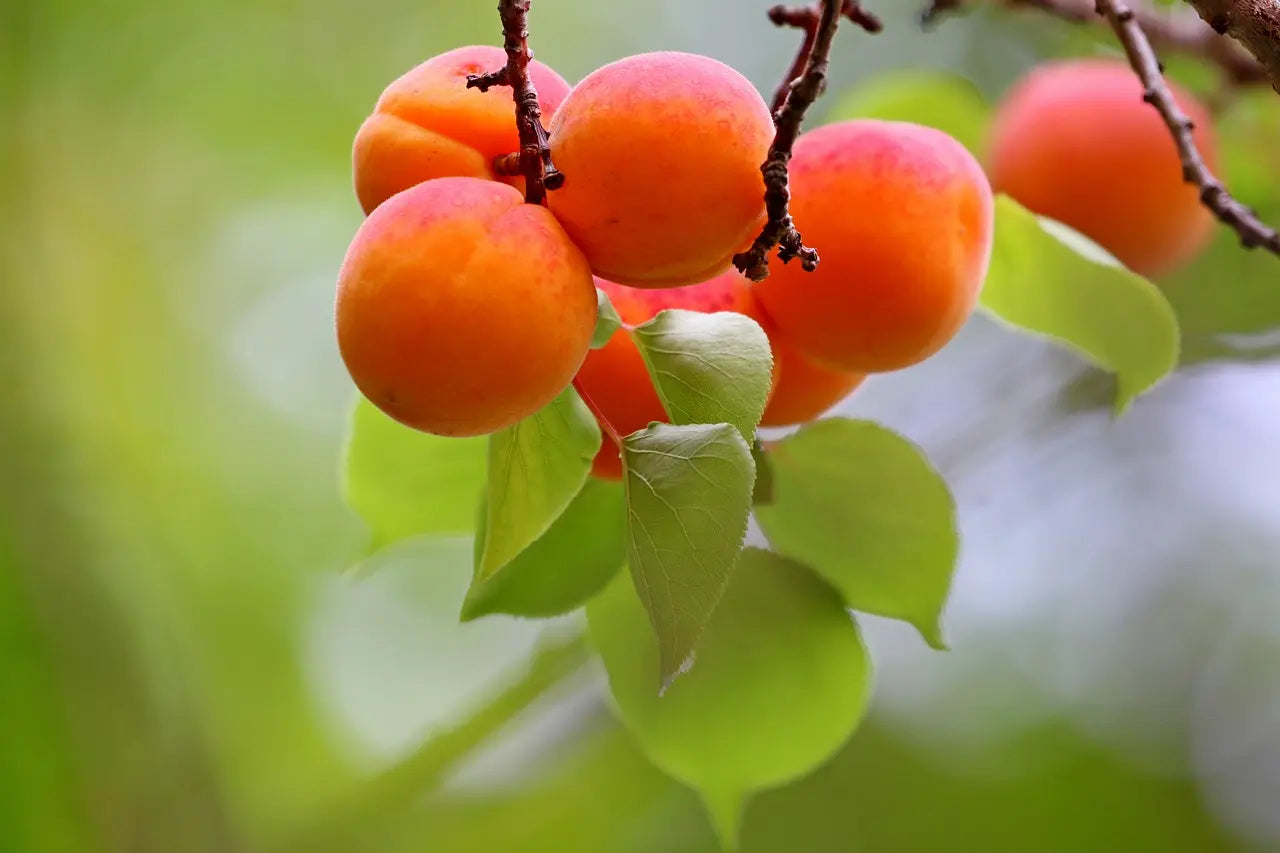-
Delivery from 10 plants to France, Switzerland and Europe
Delivery method -
Fruit Tree Wholesale Supplier
About Us -
Quality Fruit Tree Plants
Technical itinerary
Deseo Apricot Tree grafted on Mirab.29-C 1L pot
Deseo Apricot Tree grafted on Mirab.29-C 1L pot
The prices shown are our base prices for large volumes. Depending on the quantity ordered and the producers’ pricing scales, the rate may be adjusted upward. Each quote is personalized to ensure you receive a fair price.
Mini order 50 units / Multiple orders 10 units (FRSHER202503001)
Couldn't load pickup availability
 Buy now and get it delivered when you're ready to plant - Add your desired date to your quote request
Buy now and get it delivered when you're ready to plant - Add your desired date to your quote request
- Delivery from 10 plants to France, Switzerland and Europe

Technical sheet of the Deseo Apricot variety
- Fruit flesh color: Orange, juicy, sweet and balanced
- Skin color: Orange with a red or pink overprint
- Size and Shape: Medium to large size (approximately 45-70g), rounded to slightly oval shape
- Tree size: 4 to 5 meters at maturity, semi-erect to spreading habit, medium to strong vigor
- Fruit maturity: End of June to July
- Fruit taste: Juicy, sweet flesh, with a good sugar/acid balance; good taste quality
- Earliness of the variety: Mid-season
- Fruiting period: End of June to July
- Disease resistance and storage: Good tolerance to brown rot and bacterial wilt; satisfactory post-harvest shelf life
- Variety yield: Estimated between 50 and 80 kg/tree from the 5th or 6th year
- Commercial use: Fresh market, short supply chains, artisanal processing (jams, compotes, pastries)
- Comments: Recent variety, suitable for professionals looking for a productive and high-quality apricot tree. Good drought tolerance once well established. Choice of rootstock is crucial for success: GF 677 and Cadaman® for calcareous soils; Montclar or Myrobalan for heavy soils; Rootpac® R is possible in stressful conditions. Planting should be tested on a pilot plot if there is any doubt about local adaptation.
Quick Read / The Essentials of the Deseo Apricot Tree
The Deseo apricot tree is a promising variety , appreciated for its taste quality , its productivity and its good adaptation to professional orchards . Its fruits, of medium to large size , with juicy and sweet flesh , are intended for fresh consumption , with possible use in artisanal processing (jam, compote, pastries). The satisfactory post-harvest performance gives this variety a logistical interest for local or short-distance marketing.
In terms of vegetation, Deseo forms a tree of medium to strong vigor , with a semi-erect to spreading habit , reaching 4 to 5 meters at maturity . Its balanced structure facilitates cultural interventions and the distribution of light. Although its self-fertility is not formally confirmed, it is probable, as with many modern varieties. The presence of other apricot trees flowering concurrently is however recommended to secure pollination .
For arborists wishing to guarantee an optimal start, it is strongly recommended to purchase Deseo apricot plants from Arboriverse, a specialist wholesale supplier of apricot plants . The choice of the appropriate rootstock (GF 677, Montclar, Cadaman® or Rootpac® R) allows for optimal establishment depending on the type of soil and local conditions .
Deseo also has good tolerance to common diseases such as brown rot, as well as interesting resistance to drought once well established. Buying Deseo apricot plants from Arboriverse, a specialist wholesale supplier of apricot plants , means ensuring a reliable variety for high-quality and sustainable production .
Presentation of the Deseo apricot variety for professional growers in France
The Deseo apricot tree is attracting growing interest among apple growers due to its productivity and the taste quality of its fruit. Although specific data on certain parameters are still limited, the available characteristics allow its integration into a professional orchard to be considered, particularly in contexts of varietal diversification and the search for fruit quality.
General characteristics of the fruit
The fruits of the Deseo variety display the typical attributes of apricots intended for consumption. The flesh, although its exact color is not specified, can reasonably be estimated as orange, as is the case for the majority of varieties. Size information is not specified, but successful apricot trees in professional orchards usually produce medium to large fruits, around 45 to 70 grams.
The skin of the fruit is not precisely described for Deseo, but based on contemporary varietal standards, it can be assumed that it is predominantly orange, often accompanied by a more colorful area, reddish or pinkish, in the sun. The shape of the fruit is not specified, but it is likely rounded to slightly oval, with a typical groove on the side.
No direct data on sugar content was provided, but Deseo is known for its taste quality. Therefore, one can expect a balanced flavor, sweet with a touch of acidity, and juicy, pleasant flesh. Storage time is not documented, but the fruit's post-harvest stability appears satisfactory according to the available information, which is an advantage for transport and marketing.
Tree development and behavior in the orchard
The Deseo tree reaches an average adult height of between 4 and 5 meters, which allows for good cultural management while ensuring a sufficient yield per tree. It has medium to strong vigor and a semi-erect to spreading habit, naturally structuring a well-balanced crown, favorable to good light distribution.
Staking is recommended during the first few years, particularly to support the development of the main trunk and the structural branches. By the third year, the tree is generally self-supporting. In terms of longevity, the Deseo apricot tree is in the upper average range, with an estimated lifespan of between 35 and 45 years in good growing conditions.
Earliness and production schedule
Precise data on Deseo's earliness are not available, but its market positioning appears to be aimed at a classic summer harvest period, between late June and July. This harvest window is particularly attractive for producers wishing to stagger their production with other early or late varieties.
Deseo, like many modern varieties, is likely self-fertile. There is no information that explicitly confirms this, but the presence of compatible varieties nearby is always beneficial for optimizing fruit set, even in self-fertile varieties.
Disease resistance and environmental adaptation
The Deseo apricot tree is considered generally resistant to the most common diseases affecting apricot trees, including brown rot and bacterial wilt. However, the application of preventative copper-based treatments remains recommended in high-risk conditions. Regarding pests, little specific information is available, but regular monitoring for aphids and mites is essential, especially in spring.
This variety adapts well to various soil types, provided they are well-drained. Like most apricot trees, Deseo is susceptible to root asphyxiation. Therefore, compact and poorly aerated soils should be avoided. Its tolerance to limestone appears to be good, especially if you choose a suitable rootstock such as GF 677, known for its good compatibility with calcareous and dry soils.
Deseo also appears to exhibit some drought resistance once well established. This characteristic is essential for regions in southern France where dry summer periods are common.
Choosing the rootstock
The choice of rootstock will directly influence the performance of the Deseo variety depending on the soil and climate conditions of the planting site. For well-drained, calcareous soils, peach-almond hybrids such as GF 677 or Cadaman® are solid options. For heavier or moister soils, plum trees such as Myrobalan or Montclar are preferable.
Newer rootstocks, such as Rootpac® R or IZIAGAT, can also be considered to improve the tree's resilience to abiotic stresses.
Performance and economic potential
No specific quantitative data are available regarding the average yield per tree for Deseo, but the variety is described as productive. Under optimal conditions, a well-managed apricot tree can produce between 50 and 80 kg of fruit per year, starting in the fifth or sixth year. This potential is strongly linked to planting density, training pruning, irrigation and fertilization practices, as well as plant protection management.
Thanks to their organoleptic qualities, Deseo fruits are particularly well suited to fresh sale in local markets or through short supply chains. They can also be used in processing, in the form of jams, compotes or pastries, although there is no specific information confirming their suitability for these uses.
Final recommendations
The Deseo variety is an interesting option for professionals wishing to diversify their orchard with a variety combining productivity, taste quality and good fruit stability. In the absence of precise data on certain technical points (self-fertility, detailed resistance, quantified yield), it is recommended to rely on the experience of other producers, field observations, and to seek the advice of a specialized nurseryman or a local technician.
A test on a pilot plot or a small-scale plantation can allow you to evaluate the performance of the Deseo variety in the specific soil and climate conditions of your farm.
To summarize: Apricot Deseo
The Deseo variety is a strategic choice for producers wishing to diversify their orchard with a productive variety, well suited to short supply chains and fresh consumption . Its medium to large fruit, with juicy and balanced flesh , meets market expectations, both in terms of taste and visual presentation . Its good post-harvest stability facilitates logistics and commercial development.
The tree, of medium size (4 to 5 m) and with vigorous growth , fits easily into well-managed professional orchards. Although some data (self-fertility, exact yield) remain to be confirmed, Deseo demonstrates solid economic potential , with an estimated production of between 50 and 80 kg per tree in optimal conditions.
To maximize its performance, it is essential to buy Deseo apricot plants from Arboriverse, a specialist wholesale supplier of apricot plants , which offers certified plants, adapted to the requirements of professionals. The choice of rootstock , such as GF 677 for calcareous soils or Myrobalan/Montclar for heavier soils, will determine the success of the crop.
Deseo is also drought tolerant once well established, making it a suitable solution for areas in the south of France subject to summer water stress . To secure your project, it is wise to test the variety on a small scale and benefit from the advice of Arboriverse, a specialist wholesale supplier of apricot plants , your expert partner for buying Deseo apricot plants and successfully planting your plants.
-
Deseo Apricot Tree grafted on PR-R/Mirared bare-root 100-120 cm
Regular price €7,00 EURRegular priceUnit price / per -
Deseo Apricot Tree grafted on Mirab.29-C bare-root 100-120 cm
Regular price €6,60 EURRegular priceUnit price / per -
Deseo Apricot Tree grafted on PR-R/Mirared 1L pot
Regular price €7,00 EURRegular priceUnit price / per -
Deseo Apricot Tree grafted on Mirab.29-C 1L pot
Regular price €6,60 EURRegular priceUnit price / per



